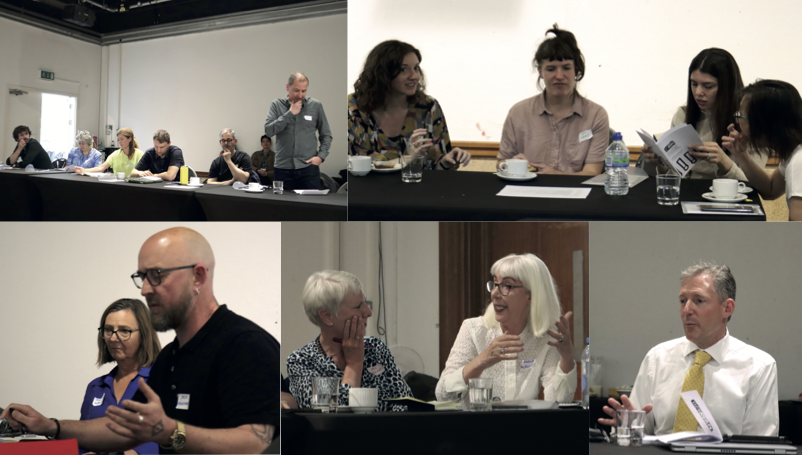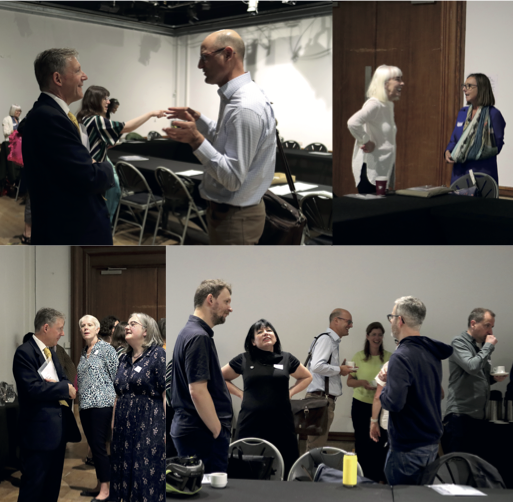
Last week the Centre for Postdigital Cultures hosted an event under the auspices of the Midlands4Cities Dialogue Day entitled, ‘Getting Real about supporting Creative Industries/Cultural Policy Research’. Our inspiration for this event stemmed from frustration over what seemed to be, despite collective agreement on the importance of Creative Industries research and the strategic missions to support the creative industries from UKRI, the existence of a tacit higher bar to getting either practice-based research or critical empirical research projects that take the Creative Industries as their object, funded.
We wanted to unpack the reasons for this – but also to acknowledge that they might reflect broader, structural tensions associated with the place of arts practice, creative industries, and cultural policy research within the academy.These tensions include,
- Between the kinds of research that institutions, practitioners or policymakers within the cultural and creative sector might need and the kinds of research that universities can produce.
- Between research which aspires to be ‘useful’ and research which is more focused on scholarly debates for their own sake.
- Between different disciplines and the territorial markers between the arts & social sciences.
- Between the distinct kinds of knowledge that either arts practice research or ‘traditional’ arts and humanities research produce and the kinds of evidence that is listened to by policymakers.
We invited a range of people with different stakes in these tensions to discuss them. They included representatives of institutions, artists, and practitioners from different bits of the cultural and creative sector in our region, researchers, including early career researchers working on and in the creative sector from different disciplines and people directly involved in policymaking at national and regional level.

The discussions were wide-ranging and stimulating and we are grateful to the colleagues who gave up their time to contribute for their care and candour in addressing our questions. We will be thinking more about the conversation in the coming months, but we wanted to give a quick summary of four key points that seemed to emerge.
The first concerned the term ‘creative industries’ itself. The rhetoric of the economic contribution of the creative industries has been a recurring focus of UK cultural policy for three decades and is now commonly deployed in HE in arguments about the relevance of Arts and Humanities disciplines to an employability and skills-led agenda. The Creative Sector Vision from the current government is the latest incarnation of this argument. Such claims allow this sector to make an case for its significance based on the relative size of some its sub-sectors (film, TV, gaming etc.) and the major commercial outputs of global British artists. This emphasis, though, masks differences within that sector and elides big commercial drivers with those practitioners, including in the visual, literary, musical, or performing arts which are less commercially oriented and unlikely ever to be so.
This leads to a second point, as this latter group might also include the activities of regional institutions and venues which are often at the heart of more local cultural ecologies. An extension of the economic argument might be that such places function as the crucibles that forge artists who go on to reach global export fame – but that is not necessarily how they are experienced or why they are valued locally. The sustainability of these institutions instead requires infrastructures that enable artists, performers, and other practitioners to make and share work with and for their communities – and not just for a future imagined commercial return. This more local focus on supporting regional cultural ecologies has antecedence both in UK policy history and elsewhere – but it is strongly undermined by the retrenchment of local government from arts funding, as local government funding itself has been squeezed. While that money might not be coming back anytime soon, a more inclusive conversation about cultural policy that recognizes the embeddedness of local institutions and practitioners within their communities might counter the impression that policy is done to, rather than with or on behalf of them. It might include a role for universities in providing practical support and pathways for the creative graduates they produce in transitioning into local and regional cultural economies.
A third point extends from this and towards the kinds of evidence that policymakers listen to. This again reflects the prominence of economics – but specifically the version of that discipline which is more aligned with the Return on Investment narratives that emerge from the Treasury Green Book, through which public spending is justified and audited. The dominance of this mode of thought underpins regimes of measurement in which non-economic ‘outcomes’ (e.g., about social, or even health benefits of culture) need to be quantified as indicators, through the modes of evaluation required of organisations and practitioners in the sector. They know the administrative burden of such practices – while also acknowledging that the learning they can produce can be hugely beneficial. Evaluations enable dialogue with audiences and communities beyond accountability, to acknowledge the contingencies and complexities of responses to artworks or performances and to develop future projects. More creative and reflective modes of evaluation emerge to facilitate this – but it is the numbers – the ‘who’ and the ‘how many’ – that register in making the case to funders. While the language of ‘cultural value’ has done much over the last decade to broaden out debates about the contribution of culture to social life, its ultimate legacy now may be to have cemented economistic measurement as the only evidence with purchase, and of economists as the only grownups in the room when articulating the strategic ‘realities’ of the cultural sector. There have been good pragmatic reasons for these decisions, but they also serve to marginalize other forms of knowledge – including that produced by artists and practitioners themselves either in support of or through their creative activity.
Finally, the context of university research production – including its longer term (or slow!) mode of production and circulation – creates problems for both HEIs and individual researchers aspiring to be attentive to the concerns of the creative sector, including the REF regime which might disincentivize the kinds of quick responsive, useful, research which organisations might need, in comparison to the apparent gold standards of journals or monographs which are most commonly deployed to establish ‘world class’ excellence. One response to this has been AHRC’s two research centres, but the challenge for HEIs’ ambitions to support the creative sector is to work out how to make these forms of sector-facing research production the rule, rather than the exception.